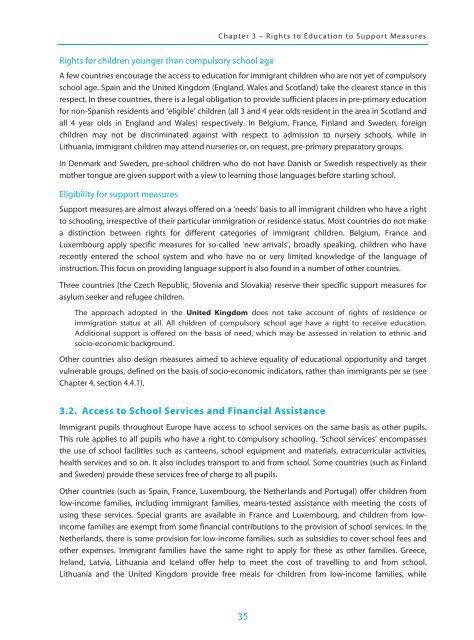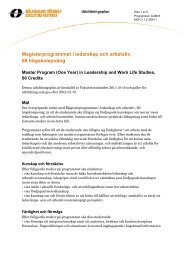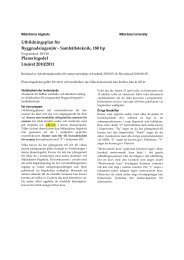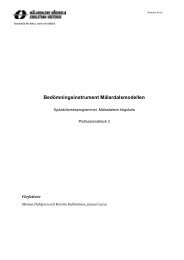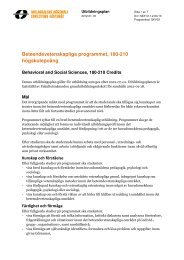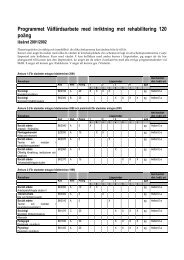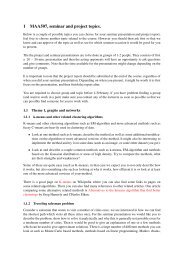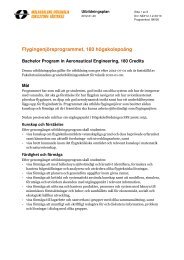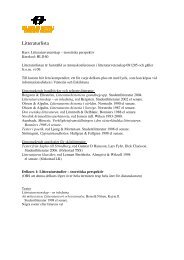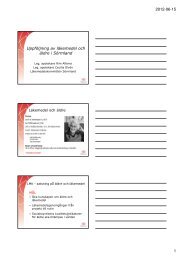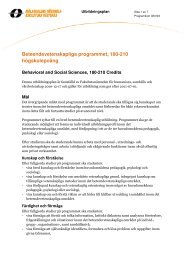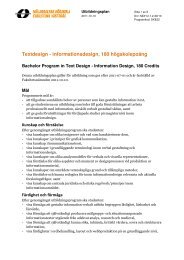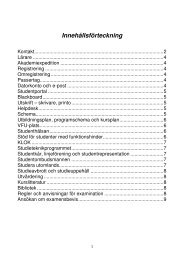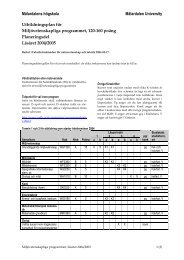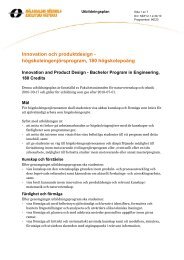Integrating Immigrant Children into Schools in Europe
Integrating Immigrant Children into Schools in Europe
Integrating Immigrant Children into Schools in Europe
Create successful ePaper yourself
Turn your PDF publications into a flip-book with our unique Google optimized e-Paper software.
Chapter 3 – Rights to Education to Support MeasuresRights for children younger than compulsory school ageA few countries encourage the access to education for immigrant children who are not yet of compulsoryschool age. Spa<strong>in</strong> and the United K<strong>in</strong>gdom (England, Wales and Scotland) take the clearest stance <strong>in</strong> thisrespect. In these countries, there is a legal obligation to provide sufficient places <strong>in</strong> pre-primary educationfor non-Spanish residents and ‘eligible’ children (all 3 and 4 year olds resident <strong>in</strong> the area <strong>in</strong> Scotland andall 4 year olds <strong>in</strong> England and Wales) respectively. In Belgium, France, F<strong>in</strong>land and Sweden, foreignchildren may not be discrim<strong>in</strong>ated aga<strong>in</strong>st with respect to admission to nursery schools, while <strong>in</strong>Lithuania, immigrant children may attend nurseries or, on request, pre-primary preparatory groups.In Denmark and Sweden, pre-school children who do not have Danish or Swedish respectively as theirmother tongue are given support with a view to learn<strong>in</strong>g those languages before start<strong>in</strong>g school.Eligibility for support measuresSupport measures are almost always offered on a ‘needs’ basis to all immigrant children who have a rightto school<strong>in</strong>g, irrespective of their particular immigration or residence status. Most countries do not makea dist<strong>in</strong>ction between rights for different categories of immigrant children. Belgium, France andLuxembourg apply specific measures for so-called ‘new arrivals’, broadly speak<strong>in</strong>g, children who haverecently entered the school system and who have no or very limited knowledge of the language of<strong>in</strong>struction. This focus on provid<strong>in</strong>g language support is also found <strong>in</strong> a number of other countries.Three countries (the Czech Republic, Slovenia and Slovakia) reserve their specific support measures forasylum seeker and refugee children.The approach adopted <strong>in</strong> the United K<strong>in</strong>gdom does not take account of rights of residence orimmigration status at all. All children of compulsory school age have a right to receive education.Additional support is offered on the basis of need, which may be assessed <strong>in</strong> relation to ethnic andsocio-economic background.Other countries also design measures aimed to achieve equality of educational opportunity and targetvulnerable groups, def<strong>in</strong>ed on the basis of socio-economic <strong>in</strong>dicators, rather than immigrants per se (seeChapter 4, section 4.4.1).3.2. Access to School Services and F<strong>in</strong>ancial Assistance<strong>Immigrant</strong> pupils throughout <strong>Europe</strong> have access to school services on the same basis as other pupils.This rule applies to all pupils who have a right to compulsory school<strong>in</strong>g. ‘School services’ encompassesthe use of school facilities such as canteens, school equipment and materials, extracurricular activities,health services and so on. It also <strong>in</strong>cludes transport to and from school. Some countries (such as F<strong>in</strong>landand Sweden) provide these services free of charge to all pupils.Other countries (such as Spa<strong>in</strong>, France, Luxembourg, the Netherlands and Portugal) offer children fromlow-<strong>in</strong>come families, <strong>in</strong>clud<strong>in</strong>g immigrant families, means-tested assistance with meet<strong>in</strong>g the costs ofus<strong>in</strong>g these services. Special grants are available <strong>in</strong> France and Luxembourg, and children from low<strong>in</strong>comefamilies are exempt from some f<strong>in</strong>ancial contributions to the provision of school services. In theNetherlands, there is some provision for low-<strong>in</strong>come families, such as subsidies to cover school fees andother expenses. <strong>Immigrant</strong> families have the same right to apply for these as other families. Greece,Ireland, Latvia, Lithuania and Iceland offer help to meet the cost of travell<strong>in</strong>g to and from school.Lithuania and the United K<strong>in</strong>gdom provide free meals for children from low-<strong>in</strong>come families, while35


